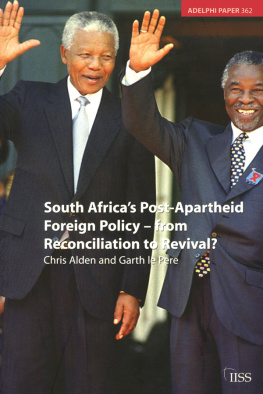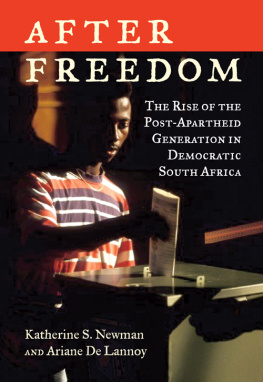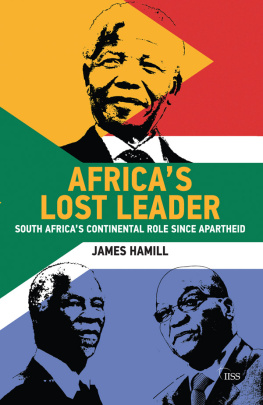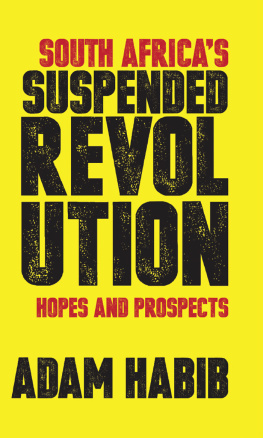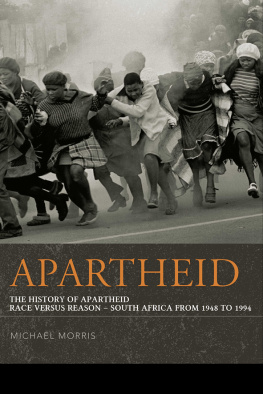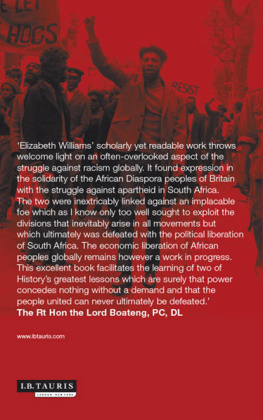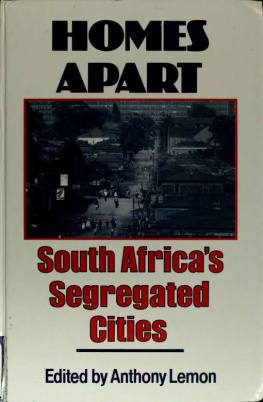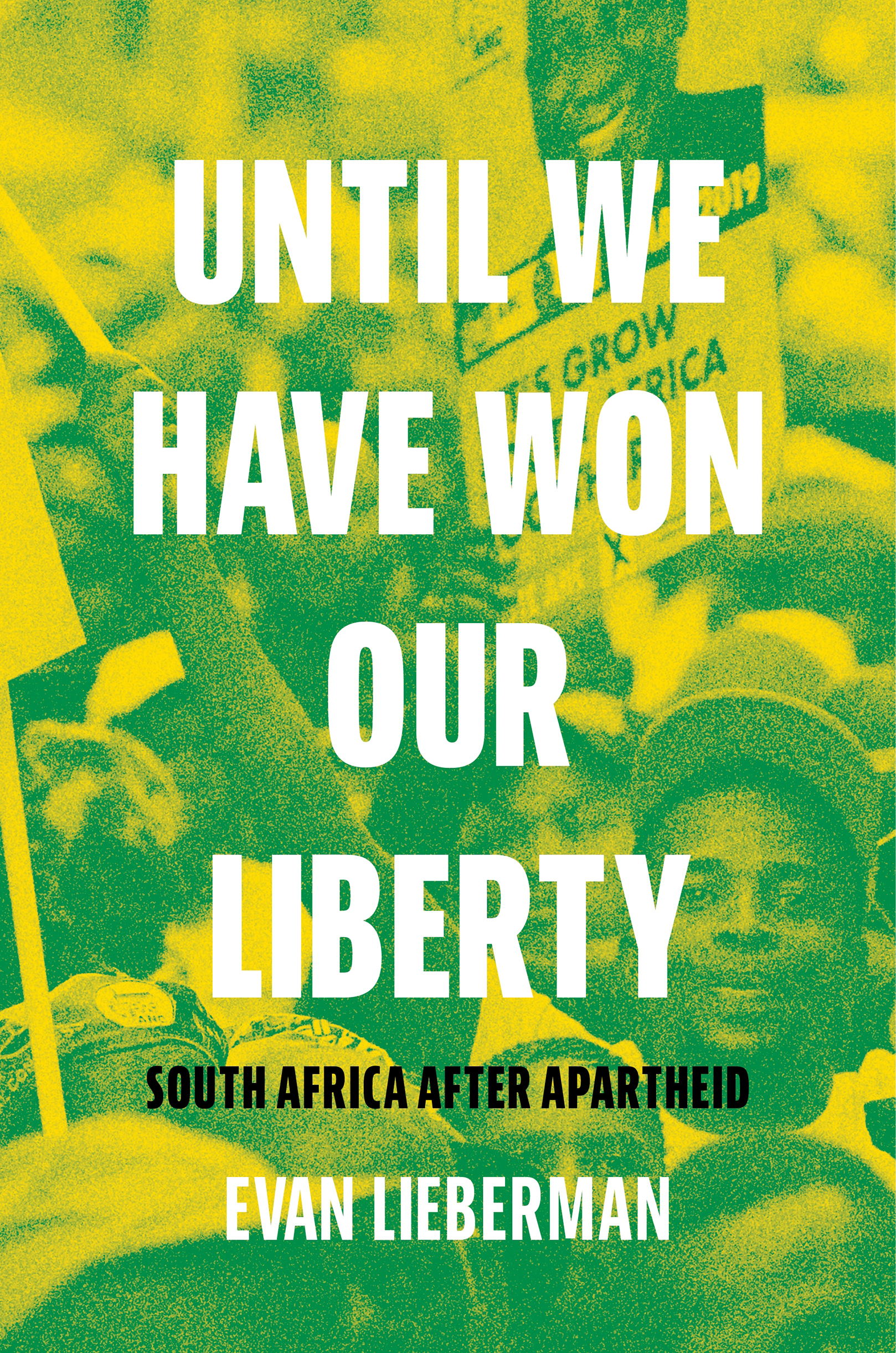UNTIL WE HAVE WON OUR LIBERTY
Until We Have Won Our Liberty
SOUTH AFRICA AFTER APARTHEID
EVAN LIEBERMAN
PRINCETON UNIVERSITY PRESS
PRINCETON & OXFORD
Copyright 2022 by Princeton University Press
Princeton University Press is committed to the protection of copyright and the intellectual property our authors entrust to us. Copyright promotes the progress and integrity of knowledge. Thank you for supporting free speech and the global exchange of ideas by purchasing an authorized edition of this book. If you wish to reproduce or distribute any part of it in any form, please obtain permission.
Requests for permission to reproduce material from this work should be sent to
Published by Princeton University Press
41 William Street, Princeton, New Jersey 08540
6 Oxford Street, Woodstock, Oxfordshire OX20 1TR
press.princeton.edu
All Rights Reserved
ISBN: 9780691203003
ISBN (e-book): 9780691203010
Version 1.0
British Library Cataloging-in-Publication Data is available
Editorial: Bridget Flannery-McCoy & Alena Chekanov
Production Editorial: Ali Parrington
Jacket Design: Lauren Smith
Production: Erin Suydam
Publicity: Kate Hensley, James Schneider & Kathryn Stevens
Jacket image: Supporters of President Cyril Ramaphosas ruling African National Congress (ANC) celebrate election results at a rally in Johannesburg, South Africa, May 12, 2019. REUTERS/Mike Hutchings/File Photo
CONTENTS
- vii
- xi
- xiii
PREFACE
DURING THE LAST WEEK OF April 1994, in villages and cities across South Africa, adults of all ages and colors joined long, snaking lines to cast their votes in an election that was broadcast to observers around the globe. Their participation marked the launch of a highly improbable political experiment. After centuries of White rule, including over forty years under an Apartheid system that separated people according to racial classification, the political landscape was transformed. The electorate, finally incorporating the Black majority, was now eight times larger than it had been during the last all-White election. The voters would choose a previously banned political organization, the African National Congress, headed by a former political prisoner, Nelson Mandela, to lead them. The new government would integrate people, local economies, and political authorities under a single system of law and governance. And they would attempt to do this while adhering to democratic principles with a commitment to the rights of all people.
I was just twenty-three at the time of this amazing political transition, and I had already been thinking about and studying South Africa for several years. For me, as an American high school student in the 1980s, Apartheid government presented a rare instance of moral clarity. There was no ambiguity about the fact that this explicitly racist system needed to be abolished, and college students, ordinary citizens, and heads of state the world over supported the cause of regime change. Before I could vote in my own country, the one political position I was certain of was my opposition to Apartheid. Since then, Ive spent my entire adult life watching and cheering for this country on the other corner of the planet, to see whether it would make good on the anti-Apartheid dreams of a truly democratic and more prosperous future.
Looking back now, there is one critical question to ask: Did it work?
In this book, I reflect on South Africas record with multiracial, democratic government. Can we say it was a success? Or did the quest for democratic integration in this divided society turn into fools gold?
In the pages that follow, I document what I have learned in my attempts to understand what came before and what came after the transition away from Apartheid. For Americans and for others who confront legacies of institutionalized racism in their own societies, South Africa offers a useful point of reference. Reflecting on its history raises important questions about social justice here and in countries around the world that are grappling with the twin scourges of inequality and intolerance.
South Africans themselves vary widely in terms of how they rate their democracy. Frustration is palpable; and commentators assessments are often dismal. Is South Africa simply going the way of past failed attempts at democratic development on the African continent? Several facts could be marshalled to support that conclusion: the country suffers from massive unemployment, poor health, poor education, and widespread corruption. By listing the set of social ills South Africans continue to face, one could quickly dismiss this democratic experiment as an unmitigated disaster.
In this book, I recognize these serious concerns, but I also try to shed light on relevant outcomes in historical and comparative perspective. In turn, my conclusions are far more favorable than local and national interlocutors have generally shared. In a mere twenty-five years, under elected Black-led governments, South Africans made remarkable gains toward achieving a more just society, with greater respect for the dignity of all peoplewhat I call dignified development. Many problems remain and citizens are understandably frustrated that more has not been accomplished. And yet, we cannot lose sight of the fact that democratic practice has moderated the tensions inherent in governing South Africas diverse society. Successive democratic administrations have helped to improve the lives of millions across the country, with housing, basic services, social security, access to education, and more, and they have done so without resorting to political extremism or the complete exclusion of any minority groupa fear that many expressed at the dawn of the democratic era.
This book is based on observations from decades of field research in South Africa and a great deal of teaching, research, and analysis along the way. During the months before and after the 2019 election, I made repeated visits to Mogale City, a municipality that serves as something of a microcosm and a key focus of the book. I conducted several dozen interviews there and engaged in various types of participant observation, including attending rallies and council meetings, hanging out around polling stations, and occasionally jumping in a pickup truck to watch a politician engage in constituent service. I followed up on leads and referrals, and tried to use my instincts and knowledge of the context to adjudicate between fact and fiction.
A wide range of voices, including those of current and former mayors, local councillors, reporters, clergy, business operators, NGO leaders, and others I met around the municipality, can be heard in the pages and analyses that follow. Throughout the book, I have used the actual names of public figures (politicians, bureaucrats, and NGO leaders) I interviewed but either disguise identities or report no names for all other people interviewed in order to protect their privacy. I also drew on a wide range of primary and secondary sources, including existing high-quality representative surveys, as well as surveys I conducted myself, and a great deal of administrative data. (See for additional details on such data, including the acronyms used to identify various surveys and data sets.)
My own identitywhat some refer to as positionalityhas shaped the questions I asked and my access to certain sources of information and data; it has also influenced the conclusions I derived from my analyses. This book is not a memoir by any means, but in some parts I explicitly reflect on my own journey through this country over time. I do this in part because the fact that I saw and heard certain things myself ought to enhance the credibility of those descriptions. To be transparent, it is also important to recognize that it was all filtered through me as a person, and were I not a White American man and an academic with the resources to travel the country comfortably and in relative security, I might have encountered different people and different places, heard different facts and stories, and arrived at different conclusions. Despite more than three decades of engagement, I concede many blind spots remain. South Africa has eleven official languages, and I speak only one of them fluentlyEnglishthough I did learn enough Xhosa and a few phrases in Afrikaans to be able to express at least my desire to be empathic toward others views and to elicit smiles from my mispronunciations.


